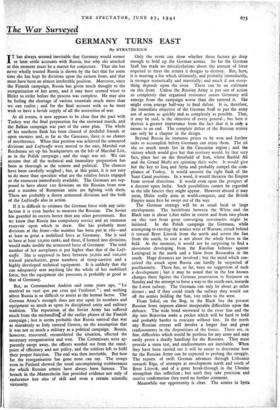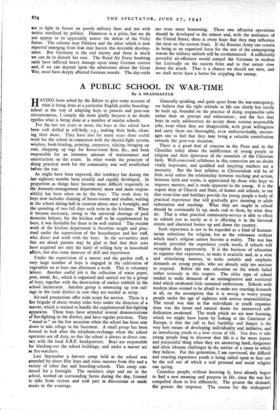The War Surveyed GERMANY TURNS EAST
By STRATEGICUS
IT has always seemed inevitable that Germany would sooner or later settle accounts with Russia, but why she attacked at this moment must be a matter for conjecture. That she has never wholly trusted Russia is shown by the fact that for some time she has kept 8o divisions upon the eastern front, and that must have been an almost intolerable position. Moreover, since the Finnish campaign, Russia has given much thought to the reorganisation of her army, and it may have seemed wiser to Hitler to strike before the process was complete. He may also be feeling the shortage of various essentials much more than we can realise ; and for the final account with us he must wish to have a lavish supply of all the necessities of war.
At all events, it now appears to be clear that the pact with Turkey was the final preparation for the eastward march, and the Balkan campaign was part of the same plan. The whole of his southern flank has been cleared of doubtful friends or open enemies and, as far as the Caucasus, there is no chance of interference. When that position was achieved the armoured divisions and Luftwaffe were moved to the east, Marshal von Reichenau set up his headquarters on the left of Marshal List, as in the Polish campaign ; and the stage was set. We can assume that all the technical and immediate preparation has been as thorough as the remote and political. The chances have been carefully weighed ; but, at this point, it is not easy to do more than speculate what are the relative forces engaged or the resources immediately available. The Germans are sup- posed to have about 120 divisions on the Russian front now and a number of Rumanian units are fighting with them. There are probably a dozen armoured divisions and the bulk of the Luftwaffe also in action.
If it is difficult to estimate the German force with any satis- faction it is even harder to measure the Russian. The Soviet has guarded its secrets better than any other government. But we know that Russia has compulsory service and an immense reservoir upon which to draw. She has probably more divisions at the front—the number has been put at i6o—and at least as great a mobilised force as Germany. She is said to have at least ro,000 tanks, and these, if formed into divisions, would make double the armoured force of Germany. The total number of her aeroplanes is put higher than that of the Luft- waffe. She is supposed to have between so,000 and t oo,000 trained parachutists, great numbers of troop-carriers and a highly developed technical equipment. It is unlikely that she can adequately arm anything like the whole of her mobilised force, but the equipment she possesses is probably as good as that of Germany.
But, as Commandant Andriot said some years ago, " Le materiel ne vaut que par ceux qui l'utilisent " ; and nothing aliout Russia is so difficult to assess as the human factor. The German Army's strength does not rest upon its numbers and equipment so much as upon its disciplined unity and military tradition. The reputation of the Soviet Army has suffered much from the mishandling of the earlier phases of the Finnish campaign ; but it seems probable that Russia entered that war as mistakenly as Italy entered Greece, on the assumption that it was not so much a military as a political campaign. Russia, however, recovered, reconsidered the situation, effected the necessary reorganisation and won. The Commissars were ap- parently swept away, the officers weeded out from the stand- point of efficiency and not policy, and the soldiers left to fulfil their proper function. The end was then inevitable. But how far the reorganisation has gone none can say. The troops even in Finland showed the usual uncomplaining stubbornness for which Russian armies have always been famous. The breach in the Mannerheim line provided evidence not only of endurance but also of skill and even a certain scientific virtuosity. Only the event can show whether these factors go deep enough to hold up the German armies. So far the German Staff has made no miscalculations about the amount of force required to meet the armies it designs to destroy. But, here, it is meeting a foe which ultimately, and probably immediately, is stronger numerically and materially; and much if not every- thing depends upon the issue. There can be no stalemate on this front. Unless the Russian Army is put out of action so completely that organised resistance ceases Germany will emerge from the campaign worse than she entered it. She might even emerge half-way to final defeat. It is, therefore, the immediate objective of the German Staff to put the army out of action as quickly and as completely as possible. That, it may be said, is the objective of every general ; but here it derives a greater importance from the fact that it is only a means to an end. The complete defeat of the Russian armies can only be a chapter in the design.
Beyond Russia lie immense prizes to be won and further tasks to accomplish before Germany can enjoy them. The oil she so much needs lies in the Caucasian region ; and the victory which would give her that territory would, by that very fact, place her on the threshold of Iran, where Rashid All and the Grand Mufti are spinning their webs. It would give her the key to Iraq and Syria and probably compel the com- pliance of Turkey. It would uncover the right flank of the Suez Canal positions. In a word, it would threaten the Empire from several directions. It would even open the prospect of a descent upon India. Such possibilities cannot be regarded as the idle fancies they might appear. However absurd it may seem, Hitler really aims at world-conquest, and the British Empire must first be swept out of the way.
The German strategy will be as usual local or large envelopment. The battlefront between the White and the Black seas is about 1,800 miles in extent and from two places on this vast front great converging movements might be initiated. In the Polish campaign the Germans, while attempting to envelop the armies west of Warsaw, struck behind it toward Brest Litovsk from the north and across the San from the south, to cast a net about the whole force in the field. At the moment, it would not be surprising to find a movement developing from the Karelian Isthmus against Leningrad in the north and a blow from Bessarabia in the south. Huge distances are involved ; but the mind which con- ceived the attack upon Russia can hardly be suspected of pusillanimity. There has, so far, been no suggestion of such a development ; but it may be noted that in the few known changes there figures the German penetration to Stojanow on Sunday and the attempt to force a way to the south-east, towards the Lwow railway. The Germans can only be about 4o miles distant ; and if they could reach the railway they would cut off the armies holding the San, too miles to the west.
From Sokol, on the Bug, to the Black Sea the present Russian front imposes almost insuperable difficulties upon the defence. The wide bend westward to the river San and the dip into Bukovina make a pocket which will be hard to hold and probably harder to evacuate without loss. In the north any Russian retreat will involve a longer line and great readjustments in the dispositions of the forces. There are, in fine, difficulties which would be perilous for any army and may easily prove a deadly handicap for the Russians. They must provide a stern test, and readjustments are inevitable. When they have been carried out it will be easier to determine how far the Russian Army can be expected to prolong the struggle. The reports of swift German advances through Lithuania towards Riga, of attempts at envelopment north and south of Brest Litovsk, and of a great break-through in the Ukraine strengthen this reflection ; but until they take precision and receive confirmation they need no further comment.
Meanwhile our opportunity is clear. The armies in Syria are to fight in future on purely military lines and not with tactics sterilised by politics. Damascus is a prize, but we do not appear to be appeciably nearer the defeat of the Vichy forces. The column near Palmyra and the other which is now reported emerging from Irak may hasten this desirable develop- ment. But Germany is the real enemy and there is much we can do to disturb her rear. The Royal Air Force bombing raids have inflicted heavy damage upon many German centres and, if we can depend upon the admissions about the Great War, must have deeply affected German morale. The day-raids are even more heartening. These two offensive operations should be developed to the utmost and, with the assistance of the United States, there is every hope that they may influence the issue on the eastern front. If the Russian Army can remain in being as an organised force for the rest of the campaigning season the military outlook will be revolutionised. A sufficiently powerful air-offensive would compel the Germans to weaken the Luftwaffe on the eastern front and to that extent slow down the attack. That is a chance we should not miss, and we shall never have a better for crippling the enemy.























 Previous page
Previous page